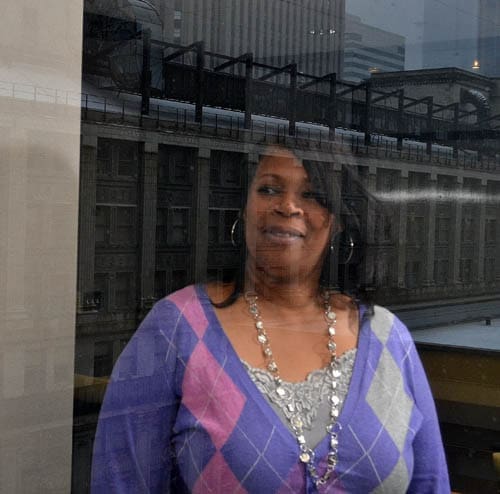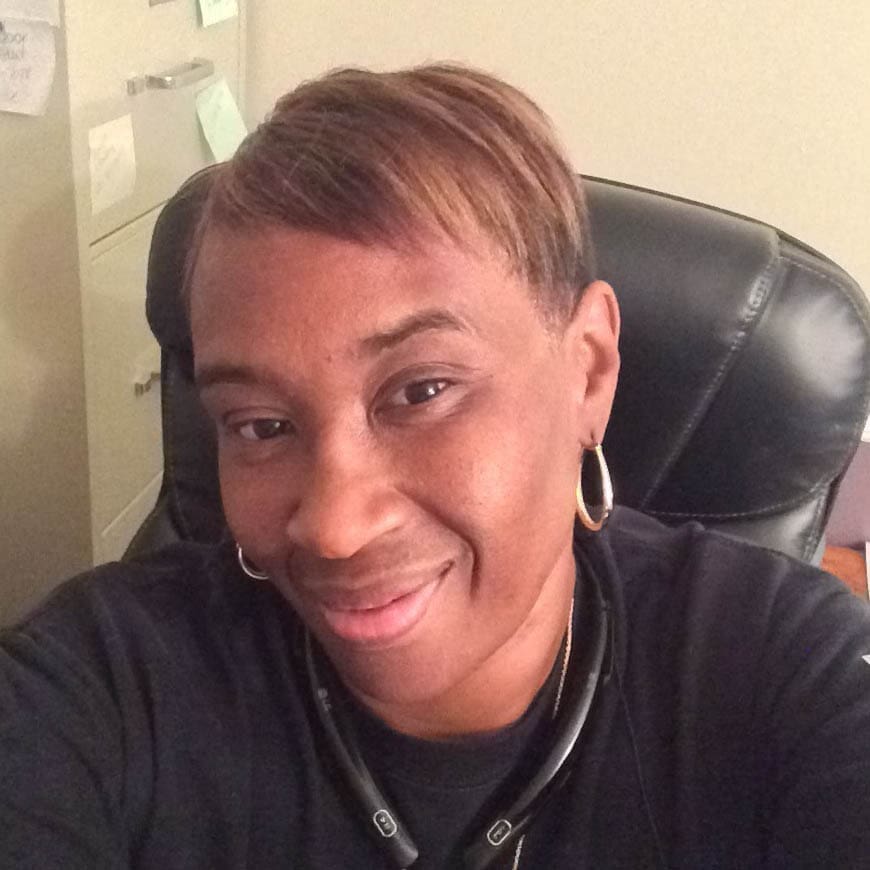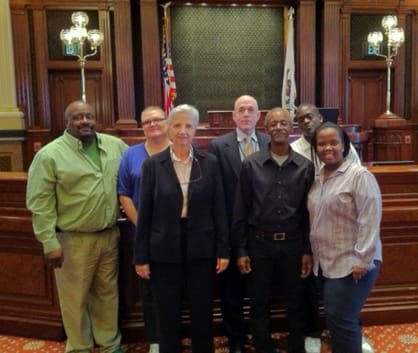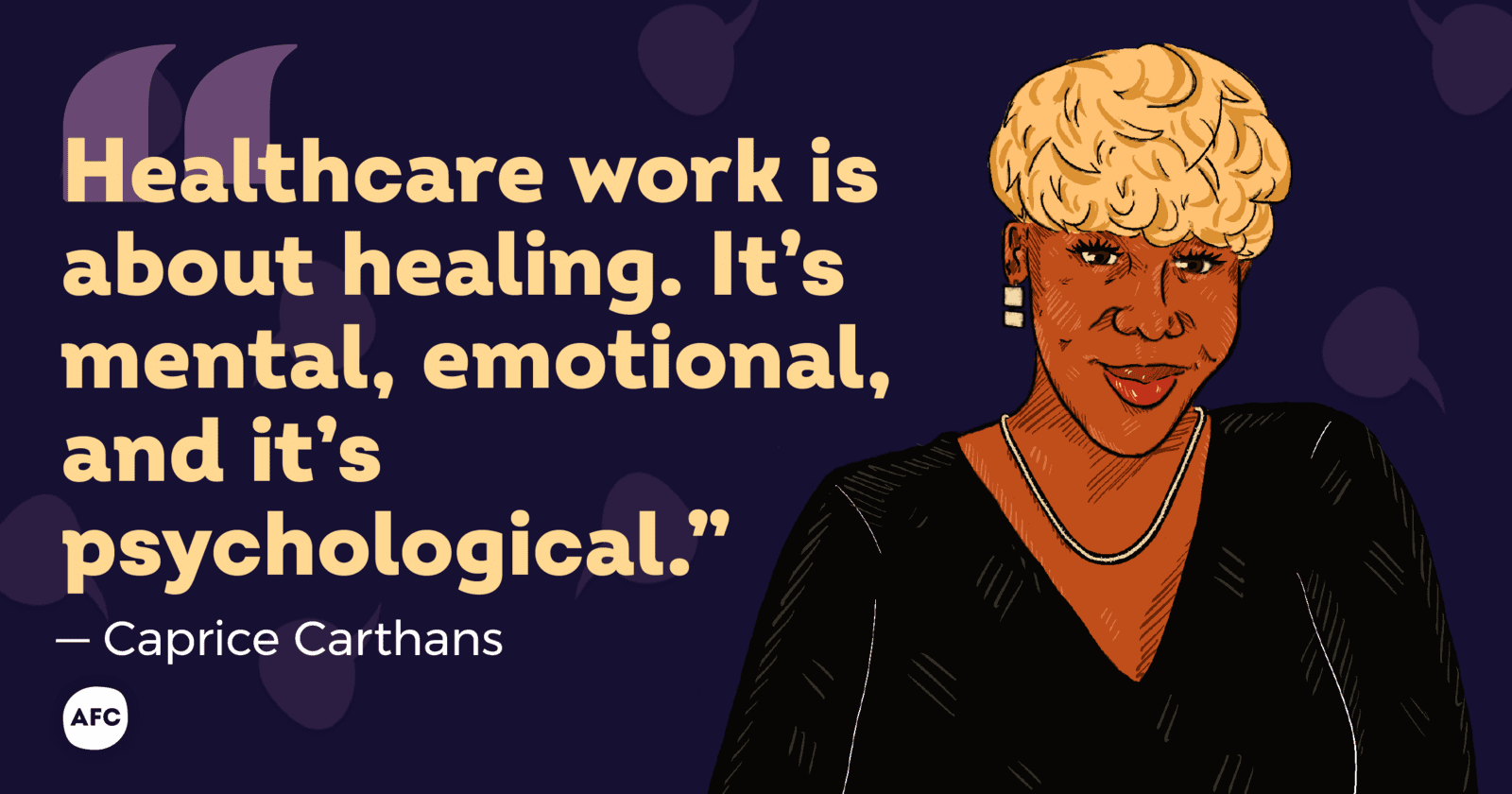 |
| Melanie Paul, supportive housing coordinator at AFC. (AFC Photo-Ed Negron) |
This story is the first in an occasional series of profiles of the people who work for the AIDS Foundation of Chicago and its community partners, and of the people we serve.
“So, I was homeless and living in a crack house in Gary, Indiana.”
Today, Melanie Paul is a bright, professional and committed supported housing services coordinator for the AIDS Foundation of Chicago (AFC). But her path getting to today has been more tortured and precipitous than any Himalayan trek, taking her to thin edge of death repeatedly.
Her story is a remarkable narrative of addiction, survival, family, tough love and, ultimately, redemption. It is also emblematic of the two-headed problem commonly seen by AFC and the case managers who work in the field: homelessness and substance abuse. About half of AFC clients who receive supportive housing assistance have reported substance abuse issues. (That is only the reported percentage — the actual number could be higher.)
With her raspy voice and ready laugh, she tells it with the confidence of someone who has told her story many times before, in front of strangers and friends alike at Narcotics Anonymous meetings.
“I always say I went to a party in 1984 and didn’t come out of the party until 1997,” Paul said.
Paul, 45, was born and raised in the South Side community of Roseland, the youngest daughter of a postal worker and a nurse. Her childhood was idyllic, playing with her brother and sister in the tree-lined streets, spending summers with her mom’s family in Jackson, Miss. Paul was a three-sport athlete — basketball, swimming and softball — in high school (at what is now known as Christian Fenger Academy High School).
But toward the end of high school, Paul began experimenting with marijuana. Then, as it did in big cities all across the United States in the mid-1980s, crack hit the streets of Chicago. Paul experimented with that, too.
Her sister, Alisa, and her brother, Dean, would avoid the pitfalls of drug addiction, pursuing interests in art and music.
“They did constructive stuff and I just lost my mind, pretty much,” Paul said with a short laugh.
She worked odd jobs in her early 20s before being hired at McDonald’s. Paul became adept at fast food management, and even more adept at managing her crack addiction. She worked the second shift, a 4 p.m. to midnight shift, partied all night, slept in the day. Repeat cycle.
Running from Addiction
Amazingly, when she was pregnant with her son Dominique, in 1992, and her daughter, Brianna, a year and a half later, she abstained from drugs and alcohol.
“I don’t know how I was able to do what I did,” Paul said. “Didn’t even crave drugs or alcohol during my pregnancies.”
But after both childbirths, she fell back into her old ways. With both fathers out of the picture, it would be Paul’s mother and father who would care for the young children.
In 1996, Paul left Roseland for Gary, Ind., in hopes of a fresh start. She had a telemarketing job lined up and rent was cheaper there.
“I was trying to run from my addictions,” she said.
She experienced homelessness for the first time, sleeping on a friend’s floor before being able to rent her own apartment. The telemarketing gig didn’t pan out and Paul returned to fast food. Her children came to live with her and, by now, they were school age, which made it easier for Paul to balance her drug use with work and the children.
She fell behind on rent and was close to eviction. Her parents offered to help if she attended outpatient treatment for drug addiction. Paul was clean for 90 days and noticed a difference in the quality of her life and her relationship with her children. But it didn’t last.
“The day I graduated, I used,” Paul said. “Graduation was at noon, I was probably high by 12:30.”
From there, things got worse in a hurry. She sent her children back to Chicago to live with her parents. And she was soon evicted. Paul fell in with a younger man, a partner in crime, and they lived in an abandoned crack house.
In August 1997, Paul found out she was HIV-positive. The diagnosis meant very little to her at the time. She went and got high.
“I didn’t even know what that meant,” Paul said. “When I left the world, HIV was new on the scene and it was only affecting gay men. So I didn’t know anything.”
Just a few weeks later, Paul was shot in the back in a botched attempt at robbing a drug dealer. She didn’t go to the hospital. She used. Around the same time, her mother discovered that she was HIV-positive and demanded that she come back to Chicago to surrender custody of her children.
“She said, ‘I guess I’ll put my black dress in the cleaners,’ ” Paul recalled.
One Road Ends…
So, Paul and her partner in crime stole a car and headed for Chicago, robbing some Indiana convenience stores along the way. When they pulled off the highway in Chicago, blue lights flashed in their rear view mirror. At the time, Paul was in possession of drugs, a gun and outstanding warrants for her arrest.
“I feel like that was God saving my life,” Paul said. “I remember feeling like, I can’t keep doing this. It was like a movie of someone else’s life.”
 |
| Melanie poses with daughter, Brianna, and son, Dominique in recent photo. |
She spent seven months in Cook County Jail before returning to Indiana to serve time there. Upon release, she returned to Chicago. For the next few weeks, she lived on the streets, sleeping on the Red Line train, and trying and failing at treatment several times.
Her normally even keel father was furious with her. Her mother would feed her but not always let her in the house. At times, she would let her in to shower but instruct Dominique and Brianna to follow their mother around and ensure she didn’t steal anything. It was tough love.
Finally, in June of 1998, Paul had had enough. She walked from her parent’s house to the Haymarket Center, a residential rehabilitation center — a distance of about 16 miles. Paul made the walk in two days. Upon arrival, she never used again.
“I was just really, really tired,” Paul said.
…Another Begins
From there, her story shoots upward like a sprout yearning for sunlight. Paul came to terms with her HIV status and learned how to take care of herself. She re-established a relationship with her children and set about learning how to be a good parent. She became a peer educator at the Christian Community Health Center, where she would work in various roles for 10 years.
As Paul learned more about HIV, she became an advocate.
“I got involved in the field and saw other people living healthy lives. That helped. I felt really isolated when I first got my diagnosis,” Paul said. “When I got involved and advocating for people with HIV, I started to see a lot of people were just normal – men, women, gay, straight – just regular people.”
At Narcotics Anonymous meetings, Paul would always include her HIV status when she stood up to tell her story. It wasn’t well-received by all, she said. But there were always a few people who would come up to her later and thank her. Others would tell her they were HIV-positive, too, and she helped link them to care.
“I felt like not only was I helping someone else but I was helping myself,” Paul said. “If I wasn’t open and honest about having HIV, I wouldn’t talk about it, I wouldn’t stay in care, I wouldn’t do anything.”
Through her NA meetings, she met her husband, Kelvin. Her children are now teenagers (both are HIV-negative). After working for years as a housing case manager, Paul now helps coordinate housing services at AFC.
She wiped away tears thinking about how her parents and siblings, particularly her sister, helped her over the years.
“My greatest joy is I have a relationship with my parents and they’re able to see me be a great mom, be a great wife, be a great daughter, be a great person in the community who’s making some changes,” Paul said.
Paul said she has concerns about her children’s generation and HIV. The fact that the HIV drugs are better and HIV-positive people are living longer may actually be causing indifference toward HIV among young people. Reaching them and educating them about HIV will be crucial to stopping the epidemic, she said. But there are also reasons for hope.
“I try to teach my kids to be that voice and spread the message,” Paul said. “ … My children are little advocates because of their mother. …I’m hoping other little advocates spring out of their friends.”



